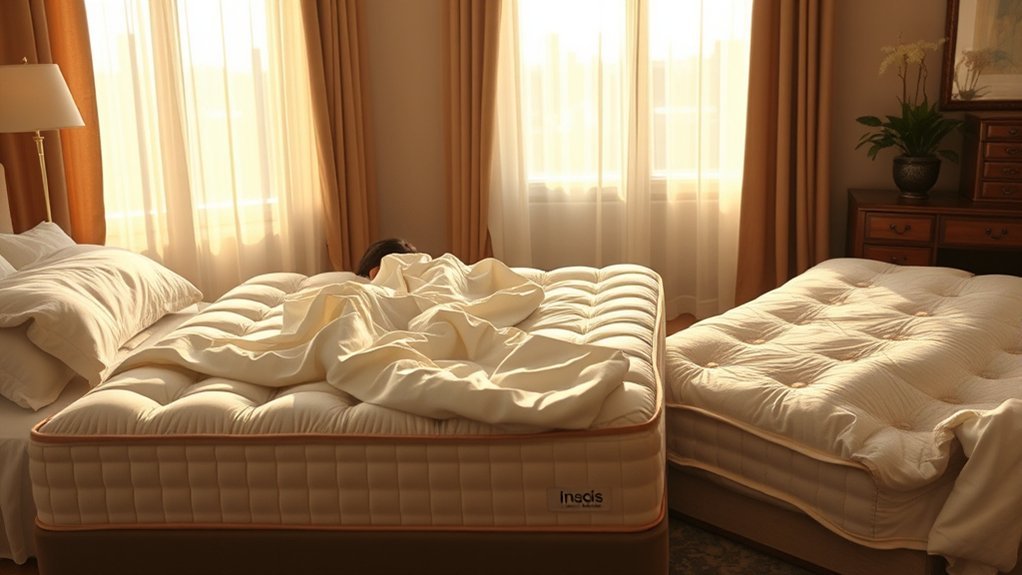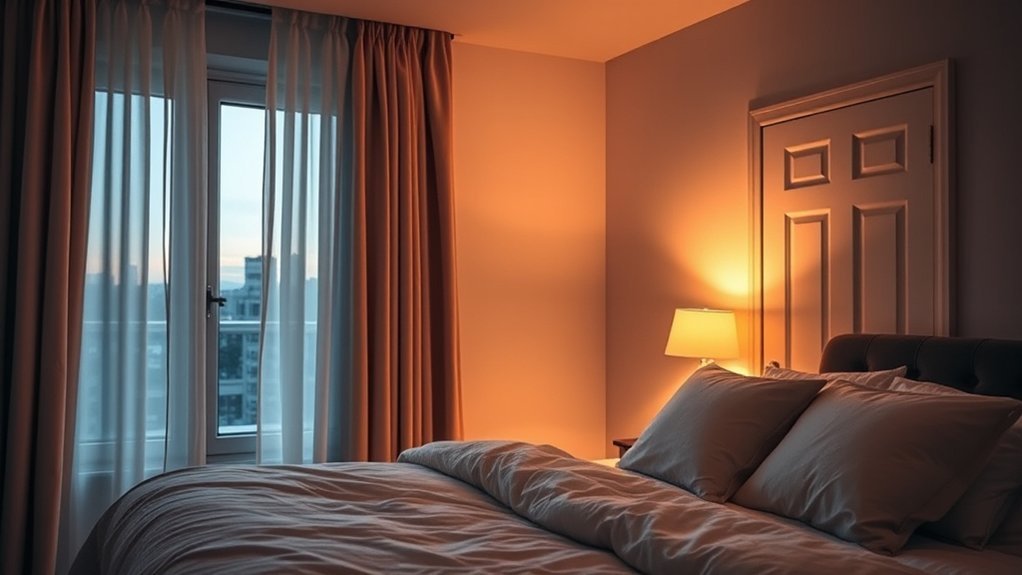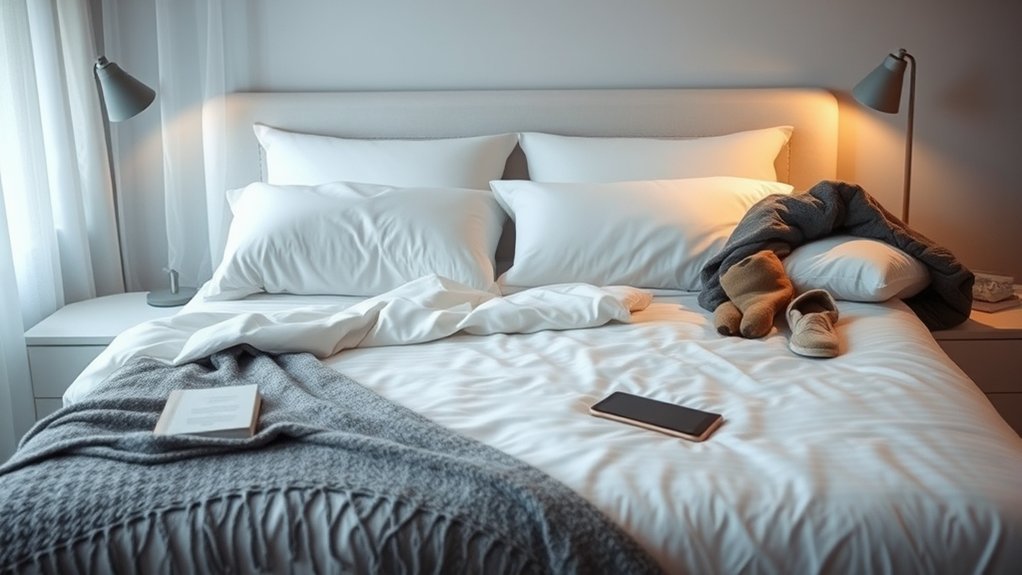When it comes to sleep comfort, making the right choices can greatly impact your rest. You need to take into account factors like your mattress, light levels, and noise disruptions. Small adjustments can create a more inviting sleep environment. However, there are common pitfalls to avoid. Understanding these do’s and don’ts can set you on the path to better sleep. Let’s explore how you can enhance your nightly routine for a more restful experience.
Choosing the Right Mattress

When it comes to choosing the right mattress, understanding your personal preferences and sleep needs is vital.
Choosing the right mattress hinges on your unique sleep preferences and needs for optimal comfort and support.
Start by considering your sleeping position—whether you’re a back, side, or stomach sleeper—as this impacts the level of support you’ll need. If you often wake up with aches, a mattress that offers proper alignment and pressure relief is essential.
Don’t forget to factor in firmness; softer mattresses suit side sleepers, while firmer options benefit back and stomach sleepers.
Additionally, think about materials—memory foam, latex, or innerspring—each offers unique support and comfort.
Finally, try before you buy. Spend time lying on different mattresses to see what feels right.
Managing Light Levels

Managing light levels in your bedroom is essential for creating an environment conducive to restful sleep.
Start by investing in blackout curtains or shades to block unwanted outdoor light. You can also use a sleep mask if curtains aren’t an option.
Dim your lights in the evening to signal your body that it’s time to wind down. Consider using warm-colored bulbs instead of harsh white ones, as they promote relaxation.
Avoid screens at least an hour before bedtime; the blue light emitted can interfere with your sleep cycle.
If you need a nightlight, choose one with soft, adjustable brightness.
Controlling Noise Disruptions

Although noise disruptions can be a significant barrier to a good night’s sleep, there are effective strategies you can implement to minimize their impact.
Noise disruptions can hinder restful sleep, but you can adopt effective strategies to lessen their effects.
Here are some tips to help you create a quieter sleep environment:
- Use white noise machines or apps to drown out sudden sounds.
- Invest in soundproof curtains or acoustic panels to block external noise.
- Wear earplugs to reduce disturbances from your surroundings.
- Establish a consistent bedtime routine to signal to your body that it’s time to wind down.
Maintaining an Optimal Temperature
To enjoy a restful night’s sleep, it’s crucial to maintain an ideal temperature in your bedroom. Most experts recommend keeping your room between 60 to 67 degrees Fahrenheit.
If it’s too hot, you may wake up feeling restless; if it’s too cold, you might toss and turn. Use breathable bedding and materials that wick away moisture to enhance comfort.
Additionally, consider adjusting your thermostat before bedtime and using fans or open windows for ventilation. If you’re sharing your bed, communicate with your partner about temperature preferences, as this can greatly affect sleep quality.
Remember that everyone’s ideal temperature varies, so experiment to find what works best for you. Prioritizing temperature can greatly improve your sleep experience.
Creating a Relaxing Atmosphere
Creating a relaxing atmosphere in your bedroom is essential for promoting restful sleep. A soothing environment helps signal to your body that it’s time to unwind.
Here are some key elements to reflect upon:
- Soft Lighting: Use dim, warm lights or lamps to create a calming ambiance.
- Comfortable Bedding: Invest in quality sheets and pillows that make you feel cozy.
- Declutter: Keep your space tidy and organized to reduce stress and distractions.
- Pleasant Scents: Utilize essential oils or scented candles to enhance relaxation.
Frequently Asked Questions
How Often Should I Replace My Mattress for Optimal Comfort?
You should replace your mattress every 7 to 10 years for ideal comfort. Regularly check for signs of wear, like sagging or discomfort, and trust your instincts—if you’re not sleeping well, it’s time for a change.
Can Diet Affect My Sleep Quality and Comfort?
Absolutely, your diet can greatly impact your sleep quality and comfort. Think about it: what you eat fuels your body. Avoid heavy meals and caffeine close to bedtime to enjoy deeper, more restful sleep.
Is Napping During the Day Beneficial or Harmful?
Napping can be beneficial if done correctly. Short naps of 20-30 minutes can boost alertness and mood, but longer naps might disrupt your nighttime sleep. Listen to your body and find what works best for you.
Should I Exercise Before Bed for Better Sleep?
Exercising before bed can feel like inviting a storm into your calm night. While moderate workouts may relax some, intense exercise often disrupts sleep. Listen to your body and choose your timing wisely for restful nights.
How Do Stress Levels Impact Sleep Comfort?
Stress levels greatly impact your sleep comfort. High stress can lead to racing thoughts and tension, making it harder to relax. Managing stress through techniques like deep breathing or meditation can improve your sleep quality.
Conclusion
In your quest for sleep comfort, think of your bedroom as a sanctuary—a peaceful retreat that nurtures rest. By choosing the right mattress, managing light and noise, and creating a calming atmosphere, you can cultivate an environment that cradles you into deep slumber. Remember, it’s not just about falling asleep; it’s about fostering a space where you can recharge and awaken refreshed. Prioritize these do’s and don’ts, and let your nights transform into a blissful escape.
